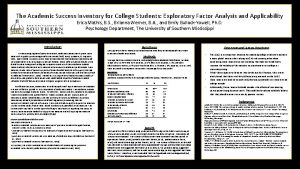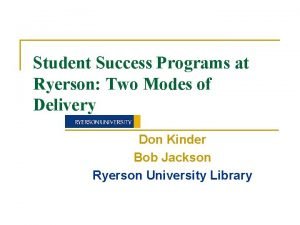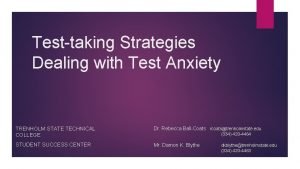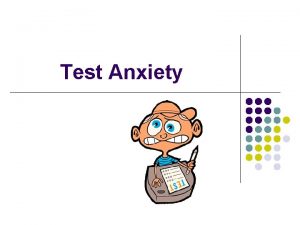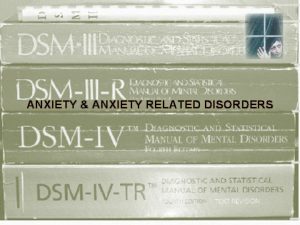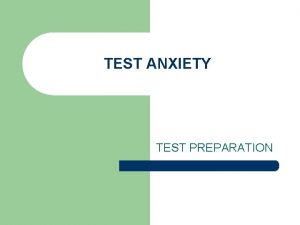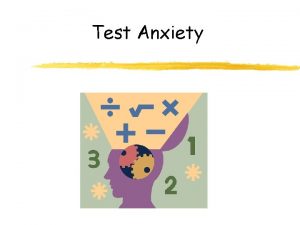Academic Success Tips Series Test Anxiety Adapted from

















- Slides: 17

Academic Success Tips Series

Test Anxiety Adapted from Beth Tidball, Director of Academic Advising 2

Test Anxiety • Anxiety during testing situations is normal and can be beneficial • Test anxiety becomes a problem when a student is so anxious performance suffers • Test anxiety must be associated with a DSM diagnosis in order to receive academic accommodations • Often caused by fear of failure, lack of confidence, and inadequate study skills • Improving study skills may build confidence and lessen anxiety in testing situations 3

Common Symptoms • Physical • Headaches, nausea, sweating, dry mouth • Emotional • Fear, anger, depression • Behavioral • Fidgeting, pacing, avoidance • Cognitive • Going blank, difficulty concentrating 4

Coping with Test Anxiety: Before the Exam • Develop good study habits • Visualize yourself doing well • Get plenty of rest the night before • Don’t consume caffeine before the exam • Get to testing room on time • Remember finishing first doesn’t equal mastery • See a counselor • Request ADA accommodations with appropriate diagnosis/documentation 5

Coping with Test Anxiety: During the Exam • Sit in the front row • Don’t talk to other students immediately before the test • Read the questions twice • Do a data dump on the back of the exam/scrap piece of paper before you start the exam (once proctor begins exam) • Ask the proctor if you have a question during the exam • Do the questions/problems you know first • Go back over exam before you turn in—did you skip anything? • Don’t change an answer unless you are 100% certain it is wrong 6

Questions & Comments 7

Test Taking Skills Adapted from Rutgers University School of Nursing Tips 8

Fundamentals of Test Taking • DO NOT CRAM • Be well rested • Be confident • Read each question carefully • Answer ONLY what is being asked; do not read into the question • Pace yourself • Make sure you answer all the questions • Don’t change your answer UNLESS you are 100% the answer is correct 9

Five Cognitive Levels & Preparing for Nursing Exams 1. Remembering 2. Understanding 3. Applying 4. Analyzing 5. Evaluating Ex Example: Studying Medication- Furosemide 1. Memorize the classification 2. Develop an understanding of the action 3. Identify specific patient situations where drug would be used/patient situations requiring care when receiving medication 4. Differentiate among side effects of this and other drugs, Determine priorities and relationships with other data 5. Make decisions based on reflection/what is the expected outcome of this drug? 10

Understanding MC questions • Case (Scenario)-Description of the patient and what is happening • Stem- That part of the question that asks the question • Distractors-Incorrect but feasible choices • Correct Response-The answer to the question 11

Reading the Question • Paraphrase the question: What is the question asking in your own words? • What are the key words in this question? • What is the time frame? • What are the answering options? 12

Nursing Exams • Exams not only test how much you remember or understand about a subject • They are designed to test your ability to think at the five higher cognitive levels and think critically • Thinking like a nurse is essential to safe and competent nursing practice at entry level 13

RACE Technique • R – Recognize information • A – What is the question asking • C – Critically Analyze options • E – Eliminate wrong answers 14

Summary • Understand the question • Identify keywords & time frame • Eliminate options • Apply knowledge successfully • Conduct your own independent research about nursing test taking skills for more information/tools to add to your tool belt • Utilize your Kaplan Resource once you are a student • Get assistance from: Didactic Instructors, Clinical Leads, Academic Success Coach, and peers. 15

Questions & Comments 16

In need of more assistance? • Contact your Academic Success Coach: • Nashville: Brittany Clapp, 615 -913 -8725, bclapp@marian. edu • Indianapolis: Robbin Sally, rsally@marian. edu • Utilize Peer Tutoring • Reach out to Counseling & Consultation Services at: 317. 955. 6150, Mon-Fri, 8: 30 a. m. -4: 30 p. m. Eastern 17
 Tips anxiety
Tips anxiety Academic sabbatical tips
Academic sabbatical tips Career success tips
Career success tips Tips for augmentative and alternative communication success
Tips for augmentative and alternative communication success Rit academic success center
Rit academic success center Student success center iowa state
Student success center iowa state The academic success inventory for college students
The academic success inventory for college students Si sessions tamu
Si sessions tamu Continuing academic success
Continuing academic success Ryerson academic success centre
Ryerson academic success centre Test nav colorado
Test nav colorado Your child's success or lack of success
Your child's success or lack of success Your child's success or lack of success
Your child's success or lack of success Relaxation techniques test anxiety
Relaxation techniques test anxiety Exam anxiety symptoms
Exam anxiety symptoms Test anxiety essay
Test anxiety essay Prayer for before exam
Prayer for before exam Klassenklima definition
Klassenklima definition






